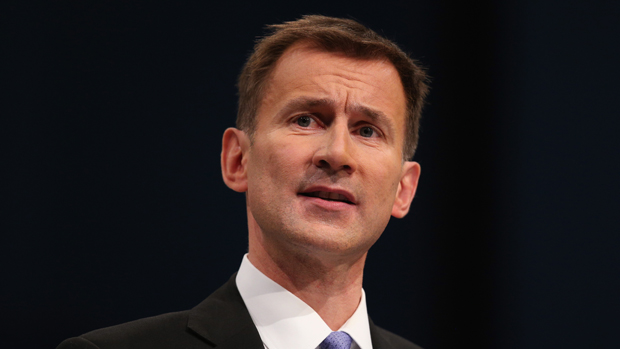Jeremy Hunt would tell small businesses no-deal Brexit was worth it
Tory leadership hopeful says he would look owners of businesses that went bust in the eye

A free daily email with the biggest news stories of the day – and the best features from TheWeek.com
You are now subscribed
Your newsletter sign-up was successful
Jeremy Hunt says he would tell businesses that went bust because of a no-deal Brexit under his leadership that their sacrifice was worth it.
Appearing on the BBC One’s Andrew Marr Show, the Tory leadership hopeful said: “At the beginning of October, if there is no prospect of a deal that can get through parliament, then I will leave at the end of October because that is our democratic promise to the British people.”
Marr asked the Foreign Secretary whether he would be willing to look the owners of family businesses in the eye and say they should be prepared to see their companies go bust to ensure a no-deal Brexit. Hunt replied: “I would do so but I’d do it with a heavy heart precisely because of the risks.”
The Week
Escape your echo chamber. Get the facts behind the news, plus analysis from multiple perspectives.

Sign up for The Week's Free Newsletters
From our morning news briefing to a weekly Good News Newsletter, get the best of The Week delivered directly to your inbox.
From our morning news briefing to a weekly Good News Newsletter, get the best of The Week delivered directly to your inbox.
Asked how he would justify this position to such small business owners, Hunt said he would tell them that a no-deal Brexit was necessary to maintain the UK’s image abroad as “a country where politicians do what the people tell them to do”.
He added: “So if, in order to do what the people tell us to do, we have to leave without a deal, I would do that. But I would find support for those companies to help them weather the storms.”
The Guardian says Hunt has “faced criticism from Boris Johnson” over his position that if a deal was very close by 31 October he might briefly extend the deadline to see it through.
It was perhaps with an eye on this very criticism that Hunt tried to position himself as the fastest route to Brexit yesterday. He told Marr: “I believe we will leave sooner with me than with Boris or anyone else because I am the person most likely to negotiate a deal. And that is the quickest way to leave.”
A free daily email with the biggest news stories of the day – and the best features from TheWeek.com
The 160,000 Conservative Party members will begin voting next week and Theresa May's successor is expected to be revealed on 23 July.
-
 How the FCC’s ‘equal time’ rule works
How the FCC’s ‘equal time’ rule worksIn the Spotlight The law is at the heart of the Colbert-CBS conflict
-
 What is the endgame in the DHS shutdown?
What is the endgame in the DHS shutdown?Today’s Big Question Democrats want to rein in ICE’s immigration crackdown
-
 ‘Poor time management isn’t just an inconvenience’
‘Poor time management isn’t just an inconvenience’Instant Opinion Opinion, comment and editorials of the day
-
 How corrupt is the UK?
How corrupt is the UK?The Explainer Decline in standards ‘risks becoming a defining feature of our political culture’ as Britain falls to lowest ever score on global index
-
 The Mandelson files: Labour Svengali’s parting gift to Starmer
The Mandelson files: Labour Svengali’s parting gift to StarmerThe Explainer Texts and emails about Mandelson’s appointment as US ambassador could fuel biggest political scandal ‘for a generation’
-
 Three consequences from the Jenrick defection
Three consequences from the Jenrick defectionThe Explainer Both Kemi Badenoch and Nigel Farage may claim victory, but Jenrick’s move has ‘all-but ended the chances of any deal to unite the British right’
-
 The high street: Britain’s next political battleground?
The high street: Britain’s next political battleground?In the Spotlight Mass closure of shops and influx of organised crime are fuelling voter anger, and offer an opening for Reform UK
-
 The MAGA civil war takes center stage at the Turning Point USA conference
The MAGA civil war takes center stage at the Turning Point USA conferenceIN THE SPOTLIGHT ‘Americafest 2025’ was a who’s who of right-wing heavyweights eager to settle scores and lay claim to the future of MAGA
-
 Is a Reform-Tory pact becoming more likely?
Is a Reform-Tory pact becoming more likely?Today’s Big Question Nigel Farage’s party is ahead in the polls but still falls well short of a Commons majority, while Conservatives are still losing MPs to Reform
-
 What does the fall in net migration mean for the UK?
What does the fall in net migration mean for the UK?Today’s Big Question With Labour and the Tories trying to ‘claim credit’ for lower figures, the ‘underlying picture is far less clear-cut’
-
 Asylum hotels: everything you need to know
Asylum hotels: everything you need to knowThe Explainer Using hotels to house asylum seekers has proved extremely unpopular. Why, and what can the government do about it?